|
So you have a great blog post in mind, or a resource you want to create for your core client group. The problem is, one of your proofreading or editing colleagues has already tackled the issue. What do you do?
For clarity, let’s think of one piece of content that would be a good contender for a blog post and downloadable PDF cheat sheet. Lots of editors and proofreaders work with academics – students, teachers and researchers – and these clients’ publishers.
Many of those academics will be dab hands at citations and referencing. Their subject’s preferred style manual will be like an old friend. But what about the beginner – like the student submitting to a journal for the first time – or the experienced scholar who’s asked to create references according to an unfamiliar style guide? Some of the best-known academic style manuals are overwhelming. And that’s why people turn to the search engines for solutions – summary cheat sheets that break the guidance down into accessible chunks. I put the phrase ‘APA style summary’ into Google. There were just under 15 million results. Who got there first? Probably not the American Psychological Association. So, if nearly 15 million people have already created this content, including some of your colleagues, why should you?
Demonstrating your knowledge – and upping your value
Let’s consider a PhD student. She’s submitting a Master’s dissertation in three months’ time and she has two problems:
First, she heads for a professional editorial directory. From it, she selects ten proofreaders and visits their websites. They all have similar experience and training. All ten proofreaders therefore solve the first problem. Right now, her problem is whom to choose. Next, she heads to Google to solve the second problem. The sixth edition of the Publication Manual of the American Psychological Association costs just over £22 in 2017 and stretches to 272 pages. She is up to her neck in student-loan debt as it is … and 272 pages? Surely there’s some free guidance online. Remember those 15 million results I mentioned above? Now she has to sift through just a teeny-tiny bit of that. Let’s go back to her first search. Imagine you’re one of those ten proofreaders, but you can solve both of her problems. If you’re the person who can proofread for her and provide her with an accessible summary of APA, you’ve just achieved the following:
Now her problem is not whom to choose but whether you’re available. That in itself is a good enough reason to get yourself a copy of the Publication Manual of the American Psychological Association (or any other style manual that your target clients use) and get busy creating blog posts and complementary summary resources. That someone else has done it already is not the issue. That you’re solving the problems of people who’ve bothered to visit your website is. It’s likely you’re being compared with others, so demonstrating wider knowledge and being helpful adds value to what you bring to the table and makes you stand out.
Multiple problems, and keeping clients on your website
If a potential client is on your website looking for solutions to problems, two things can happen:
Most of our clients don’t have one problem (say, finding an editor). They have a stack of problems. The more you can solve, the longer they’ll stay. I’m told that Google gives brownie points to websites that are lingered on, but even if it didn’t, every minute a potential client is on your website is a minute they’re not on your competitor’s. That’s another minute of engagement, another minute’s worth of trust, another minute where they might visit the Get a Quote or Contact page. Of course, there’s an alternative. Back to our Master’s student. You’re one of the ten proofreaders she selected. She also needs help with APA citation and referencing. Your website tells her all about what a brilliant proofreader you are. You want to help her with APA styling. But you don’t want to create a summary because your lovely colleague Josie Proofreader has already done something similar. Instead, you kindly put in a big fat link to Josie’s website so that your potential client can access this fabulous resource. The client skips over to Josie, sees that she’s also a brilliant proofreader, and promptly forgets the ten she was previously considering (including you). After all, Josie is so helpful, so knowledgeable – her site’s like a one-stop shop. Now her problem is whether Josie is available. There’s nothing wrong with linking to colleagues’ sites (links to relevant websites are good for SEO) but when it comes to the really helpful, substantive, stand-out, problem-solving stuff, that should be on your site – written by you, in your voice, your style, and with your branding on it. Cite your primary sources, of course, (in this case, the APA). We, as editors, know better than anyone the problems of plagiarism and the etiquette of citation. Here’s the guidance I use for creating content (based on the advice of pro white-paper writer Gordon Graham):
Quality content you can’t create. Calling the guest contributor
There are some types of content that I don’t feel comfortable creating. For example, I’m a specialist sentence-level editor so I’m not the best person to give advice on developmental editing conundrums. That doesn’t mean I don’t want that content on my website, though – for all the reasons outlined above. Guest posts are the solution. Not just any old guests – friends and colleagues who have in-depth, specialist knowledge that I think will be of benefit to my readers. Here are just a few examples:
Their content helps to keep my readers on my website – that’s a win for me. My readers are made aware of my contributors’ expertise – that’s a win for them. And I and my contributors get high-quality inbound/outbound links to our websites – that’s a win for all of us. If your editorial blog is new and you’re looking for some guidance on what to expect from your guests, here are my rules for contributor content:
Every time we host a guest we have the potential to enrich the quality of the content on our own sites.
Writing for others, and how to bring it back
I’ve written for other people too: The Publishing Training Centre, the Society for Editors and Proofreaders, BookMachine, Society of English-language professionals in the Netherlands, An American Editor, and several editor colleagues. Every time we write for others we expand our audience reach via theirs. This may appear to contradict my earlier advice about keeping your own content on your own site. My approach is me-first, me-most. Most of the content on my site has been created by me and demonstrates my skills and my willingness to be helpful. However, curation and reciprocity have their roles – you give a little, you take a little. It’s editorial content backscratching! Repurposing is one way of bringing quality content you’ve published elsewhere back onto your own turf. Just duplicating the text isn't advisable because it can affect your website's rankings in the search engines. Instead, try these three ideas:
Summing up
More resources
Louise Harnby is a line editor, copyeditor and proofreader who specializes in working with crime, mystery, suspense and thriller writers.
She is an Advanced Professional Member of the Chartered Institute of Editing and Proofreading (CIEP), a member of ACES, a Partner Member of The Alliance of Independent Authors (ALLi), and co-hosts The Editing Podcast. Visit her business website at Louise Harnby | Fiction Editor & Proofreader, say hello on Twitter at @LouiseHarnby, connect via Facebook and LinkedIn, and check out her books and courses.
0 Comments
How do I turn my literature and creative-writing teaching background into an editorial business?25/10/2017
This week’s reader question is from a teacher of English language, literature and creative writing. She’s looking for a new direction – something beyond the school environment that will allow her to use her educational experience and existing knowledge base.
Here’s what Noella had to say:
Dear Louise, I'm a UK-based secondary-school English teacher of language, literature and creative writing, and am looking to move into editing or publishing. I feel that I already have some of the skills required but I'm also on a budget and would like to know how someone like me could perhaps sneak into this area of work via a recognized route that isn't too costly. Essentially, I want a better work/life balance and to feel more in control of my career. Hope you can advise me. Hi, Noella! Thanks so much for your question. Work/life balance Given that flexibility is important, I’m inclined to recommend the path of independent editor (freelancer), rather than working in-house. Running your own business will give you control. Setting up on your own will require a lot of hard graft at the outset (as I’m sure you realize). However, it will provide you with the freedom to choose your own hours, set your own rates, and decide which projects you wish to take on. The different levels of editing I think it’s worth summarizing the different levels of editing as this will show you where your current skills might slot in.
There’s more information in the following articles:
What would suit you? Given that you’re already immersed in teaching creative writing – albeit to a younger audience – you might do well to focus your training on big-picture work because you could utilize an already-developed skill set. Another route to consider is offering private writing tuition. Many first-time authors want to develop their craft, and if you enhance your existing knowledge base with specialist professional training and professional society membership, you'd have a powerful key selling point not only to local writers but those searching online too. And if you enjoy working with secondary-school students, there’s nothing to stop you offering private tuition to them too. You’ve already proven yourself within the school sector, but this option would allow you to continue teaching while achieving control and flexibility over your working hours. Training I’ve covered the issue of training in previous Q&As so take a look at the following articles for information about high-quality courses that focus on the broader practice of editorial work:
If you do decide to focus on big-picture editing, I’d recommend specialist training. Perhaps you’ll discover nothing new, but that will be a huge confidence booster. And if there are gaps in your skill set, you’ll find out where they are and be able to rectify the problem before you begin working with clients. Sophie Playle of Liminal Pages is an experienced developmental editor who runs two relevant courses: Also take a look at the Society for Editors and Proofreaders’ Introduction to Fiction Editing. Note that the SfEP assumes basic copyediting knowledge for this course. Getting noticed One of the biggest challenges for any new editorial business owner is getting noticed. Again, I’ve discussed marketing in previous Q&As, so you might like to review the following:
If you were to go down the route of offering creative writing courses for beginners, consider researching local writing groups; and talk to local bookshops to see if you might publicize the courses through them. How about your local chamber of commerce? Is there support there – perhaps local contacts who are involved in self-publishing? You might collaborate with the chamber to provide a beta course or seminar series that would help you learn what works and what doesn’t. This would enable you to mine your existing teaching skill set while expanding your local network. And, of course, self-publishers aren’t the only market. Mainstream publishers are a superb client base with whom to build your portfolio once you’ve completed your training because they already understand the value that professional editors bring to the table. It’s worth bearing in mind, too, that there are fewer specialist developmental editors than copyeditors and proofreaders. Moving in this direction would mean you have less competition once you begin actively marketing your new business. Budget One thing I can’t advise on is whether my suggestions are ‘too costly’! Price is always relative in any case. My recommendations are based on quality rather than affordability because I see no sense in suggesting training that won’t help you achieve career independence and fitness for purpose. Your career background will offer you a strong foundation on which to build your editorial business, and if you’re prepared to combine those skills with additional professional development and a commitment to marketing, I believe you could do very well indeed. Good luck, Noella!
Louise Harnby is a fiction copyeditor and proofreader who specializes in helping self-publishing writers prepare their novels for market.
She is the author of several books on business planning and marketing for editors, and runs online courses from within the Craft Your Editorial Fingerprint series. She is also an Advanced Professional Member of the Society for Editors and Proofreaders. Louise loves books, coffee and craft gin, though not always in that order. Visit her business website at Louise Harnby | Proofreader & Copyeditor, say hello on Twitter at @LouiseHarnby, or connect via Facebook and LinkedIn. If you're an author, take a look at Louise’s Writing Library and access her latest self-publishing resources, all of which are free and available instantly.
Macro Chat is back! This is where I hand over the Parlour reins to my friend, macro king Paul Beverley. A lot has happened since March: Paul's written lots more macros (close on 600 now) and has created another couple of dozen screencasts, 45 in all (see the Resources at the bottom of the blog for more on that). So over to Paul ...
What can macros do for you?
More and more people are taking a deep breath and loading their first macro tool. (I say ‘macro tool’ to differentiate my pre-programmed macros from those that you can record for yourself.) But why bother? What can macros do for you? 'I’m a proofreader – is there any point?' Most definitely! The better view you can get of the (in)consistency within your document before you start reading, the more problems you’ll be able to spot as you read through. Did the client pass on the editor’s style sheet? Maybe, but anyway, you can easily analyse your document to find the predominant conventions and get a count of the exceptions:
'I’m an editor, but do I need 600 macros?' Absolutely not! Indeed, that’s part of the problem, knowing where to start. (Sorry!) But if I suggest a possible general strategy, maybe that will help.
Fine! Except that (3) is a massive over-simplification. Let’s dig a bit deeper, and see how a macro-aided editor might work. FRedit – the powerhouse The principle I use (for books, anyway) is that I make as many changes as I can globally, but I do it chapter by chapter. I do a number of global find and replaces (F&Rs) on chapter 1, but I keep a list of them, so that I can do the same ones again on chapter 2 as well, and I don’t forget any of them. But hang on! Couldn’t you get the computer to go through that list and do all those F&Rs for you? Absolutely, and that’s what FRedit does! And it doesn’t just do the F&Rs, it allows you to add a font colour or a highlight to each and every F&R, and/or to track change (or not) each one – do you really want to track change all those two-space-to-one-space changes? But isn’t global F&R dangerous, especially when you can do a whole string of F&Rs at the touch of a button? Definitely, so start with just a few F&Rs and build up confidence; but if you colour or track all the changes, you’ll be able to see, when you read chapter 1, any inadvised F&Rs, so you can remove them or refine them. To give an example, if you changed every ‘etc’ into ‘etc.’ you’d get ‘ketc.hup’, ‘fetc.h’, etc.. (sic)! So use a wildcard F&R: Find: ‘<etc>([!.])’ Repl: ‘etc.\1’ (without those quotes, of course). And you don’t even need to work out those wildcard F&Rs yourself – just look in the library of F&Rs (provided free with FRedit) and gain from other people’s wildcard expertise. As you refine your F&R list, chapter by chapter, more of the dross is sorted out before you read, so (a) you miss fewer mistakes (as there are fewer to find, as you read) and (b) you can concentrate more on the meaning and flow of each sentence and (c) the job is more interesting, involving fewer boring tasks. Enjoy! Resources
Louise Harnby is a line editor, copyeditor and proofreader who specializes in working with crime, mystery, suspense and thriller writers.
She is an Advanced Professional Member of the Chartered Institute of Editing and Proofreading (CIEP), a member of ACES, a Partner Member of The Alliance of Independent Authors (ALLi), and co-hosts The Editing Podcast. Visit her business website at Louise Harnby | Fiction Editor & Proofreader, say hello on Twitter at @LouiseHarnby, connect via Facebook and LinkedIn, and check out her books and courses. How to make your proofreading and editing business stand out If you're a new proofreader or editor and you're wondering whether you should specialize, here's my advice, all packed up into a 15-page PDF booklet.
I believe that being a specialist makes sense in a global editorial market, and in this free mini ebook, I discuss how using the appropriate language helps you achieve the following goals, even if you're a new starter:
Louise Harnby is a line editor, copyeditor and proofreader who specializes in working with crime, mystery, suspense and thriller writers.
She is an Advanced Professional Member of the Chartered Institute of Editing and Proofreading (CIEP), a member of ACES, a Partner Member of The Alliance of Independent Authors (ALLi), and co-hosts The Editing Podcast.
This week’s reader question is from Pritti, who’s already secured publishing work but wants to move out of her science commissioning role. Lack of practical experience and relevant qualifications are holding her back.
Pritti says:
Thanks so much for allowing this to be a open forum/platform for beginners like me to ask questions! I am a 23-year-old law graduate who currently works as a commissioning editor for a online science publishing company. However, even though this has been a 'foot in the door' type of position, my heart is really set on going into trade publishing and becoming a freelance editor. Not only that, my position here as a commissioning editor isn't what it actually says on the tin – it's more on the commissioning side of things rather than editing. In fact, I do no editing whatsoever, in my opinion! So I feel like I'm not gaining the necessary skills I need for the industry. I was thinking that obtaining a well-recognized qualification would help get me noticed, as my ultimate goal is to become a freelance editor – but without gaining the necessary experience in my current role, and without the qualifications, I do feel like I'm at loss here. I've also applied for a number of roles but been unsuccessful owing to my lack of experience. Freelance agencies have also rejected my application for the same reasons – not having enough experience. Furthermore, there's also no way of acquiring clients where I work. Please help! Thanks so much for your question, Pritti! I accept that your current role won’t give you the practical experience you require because you’re in a commissioning rather than production role. However, I don’t think that needs to stand in your way of embarking on training that will prepare you for developmental editing, line editing, copyediting or proofreading in a freelance capacity. No training provider will turn you away because you don’t already have the experience! The UK’s Society for Editors and Proofreaders, for example, offers a suite of online training courses designed for novices and experienced professionals alike. I wonder whether because you’re working in-house you’ve got yourself into a mindset of thinking like an employee. If want to work as an independent editor, you need to start thinking like an employer (of yourself). That means sorting out everything for your business from your training to marketing to administration. Getting qualifications My first piece of advice is therefore to sort out the qualifications issue. I’ve covered this in several previous Q&As, so take a look at the articles and the list of national editorial societies below. You haven’t told me where you live but there are several distance-learning options available (in Canada, the US and the UK, for example).
Once you’ve acquired the practical skills, you’ll be in a position to begin the journey of acquiring work. Again, though, I think you need to shift into the mindset of a business owner. Getting work Freelance agencies are certainly one option, but that’s a narrow approach to take given the many others worthy of exploration. Here are some additional ideas:
Your subject specialism You told me that you’d like to work in the trade publishing sector. The term ‘trade’ refers to the publishing of materials for a general audience. If you want to be found by, for example, independent thriller writers, you’re going to need to be visible, and that may take time while you build your portfolio and your SEO. If you want to do freelance work for trade publishers (for example, Pan Macmillan or Little, Brown) you’ll might well struggle until you have more experience under your belt (unless you get lucky). I think this is something you should set your sights on further down the road. In the meantime, focus your efforts on building your freelance business – marketing yourself and practising your post-qualification craft. I always recommend that new entrants to the field focus attention on the market where they’re most likely to stand out. Specialize in what you know first; diversify later. You have a law degree. I don’t. That’s why I’d never copyedit for a law student or an academic submitting an article to a legal journal. And while I have proofread law books for academic publishers, those clients never asked me to copyedit. Your law degree means you speak a language and have a knowledge base that I don’t (and many other experienced editors don’t). You can use that to differentiate yourself. When I began my editorial business journey, I had professional training, a politics degree and experience of working in-house for a social science publisher. I didn’t spend valuable time trying to get my business off the ground by asking Gollancz if I could proofread their SF Masterworks series (much as I would have loved to do that!). Instead, I went and knocked on the door of social science publishers and spent several years honing my craft with politics, sociology, philosophy, economics and media studies books. Over time, new opportunities arose as I became more visible and my marketing efforts began to bear fruit. But it did take time, and while that happened I concentrated on where my strengths lay so that I could gain experience. I believe that you need to do the same. I think you should focus on the following client groups to begin with:
Some academic publishers also have trade divisions/imprints and so the academic work can deliver trade opportunities to the independent editor. Summing up I hope that helps you get your thoughts in order, Pritti. If you take things one step at a time, I’m confident you can get to a point where you’re immersed in the trade sector. But I’d recommend building up to it by playing to your market strengths. Good luck!
Louise Harnby is a line editor, copyeditor and proofreader who specializes in working with crime, mystery, suspense and thriller writers.
She is an Advanced Professional Member of the Chartered Institute of Editing and Proofreading (CIEP), a member of ACES, a Partner Member of The Alliance of Independent Authors (ALLi), and co-hosts The Editing Podcast. Visit her business website at Louise Harnby | Fiction Editor & Proofreader, say hello on Twitter at @LouiseHarnby, connect via Facebook and LinkedIn, and check out her books and courses.
Should you edit or proofread pornography? What if it’s erotica? Is there even a difference?
Does sexually explicit written material deserve to be edited? What is it exactly, and what is it not? And if you want to edit it, how do you make yourself visible to its authors?
Perhaps you have strict criteria for the types or subgenres of pornography or erotica that you’ll edit. In that case, how can you communicate these to potential clients?
Here’s my take. And it is only my take. Some of my colleagues won’t touch the stuff with a bargepole. And those of us who will? Well, we all have our individual boundaries. What is pornography? And what is it not? If only there were a universally accepted definition of pornography. There isn’t, alas. What you consider porn may not be what I consider porn. Or one of us might think a written work is more erotic than pornographic. Others might not even bother making a distinction. And that’s the first thing any editor needs to recognize. The term ‘pornography’ is loaded with subjectivism and preconceptions, many of them heteronormative, so what you’re expecting and what actually ends up in your editing studio could be two very different things. ‘Pornography is notoriously difficult to define, and overburdened with assumptions concerning – at the very least – gender, sexuality, power, globalization, desire, affect, and labour,’ say Rebecca Sullivan and Alan McKee. Oxford offers the following broad definition: ‘Printed or visual material containing the explicit description or display of sexual organs or activity, intended to stimulate sexual excitement.’ And broad it is. Too broad, in my opinion, because it doesn’t exclude materials with descriptions or displays of non-consenting performers and minors, which are illegal. What we can say is that definitions are contested – in society, in the courts, and in academic literature. That makes it difficult for the editor who’s asked, ‘Do you copyedit pornography?’ because even if you think you don’t, others might think you do because they have different opinions on what constitutes porn. So what do we do? I think custom guidelines are the answer, particularly if you decide to publicize the fact that you’re happy to edit sexually explicit material. Before we discuss these, let’s consider erotica.
Is there a difference between pornography and erotica?
If there is a difference, it’s unlikely that the lines of distinction so clearly drawn in your own head will be shared by everyone else you consult on the matter. Echoing Sullivan and McKee, Leon F Seltzer notes the degree to which ‘the criteria used for distinguishing between the erotic and pornographic [are] … steeped in personal moral, aesthetic, and religious values’. And he goes on to say that the erotic ‘doesn’t appeal exclusively to our senses or carnal appetites. It also engages our aesthetic sense.’ Tracy Cooper-Posey’s distinction draws specifically on novel-craft: erotica isn’t ‘only about sex, unlike its gutter-cousin, pornography. At its purest, the new erotic novel is a brilliantly-written story with super-nova sex that compliments the caliber of the writing, and is fundamental to the plot and characters. In other words, if you remove the sex, the story can’t be told.’ And so it may be that if you, the editor, decide a manuscript’s sexually explicit content contains enough celebration of the human form and is written to a high enough standard, or has a good enough plot, then it’s erotica. If not, it’s porn. It seems to me that getting bogged down in the definitions will get us nowhere fast. The terminology is as tangled as that used to describe editorial services (well, maybe not that bad!). If the author’s struggling to write well, but is trying to create erotica, who am I to say it’s porn? And if it’s just sex that aims for nothing but titillation, but it’s written beautifully, artfully, does that mean it’s no longer porn? If your decision is down to the art-versus-smut argument, one thing’s for sure: you’re going to need to see a sample. And if you want to work on only certain types of material, you’ll do well to create some guidelines.
Creating guidelines to keep you comfortable
Guidelines don’t just help you and the writer decide whether you’re a good fit. They’re also a great way of demonstrating your engagement with the subject and your willingness to have a conversation with a nervous or embarrassed author. What should you include? There’s no one way of going about this; include whatever’s important to you and what you want the author to know. Here are just a few ideas:
Are pornography and erotica worth editing?
‘Even filth needs editing,’ said my colleague Louise Bolotin when she wrote about the issue on my blog back in 2012, and I agree. The porn and erotica writers for whom I’ve worked are as committed to their writing as any crime fiction, thriller or literary fiction author. A client recently told me, ‘I love my writing and with your help I hope it can lead to something else. If we don’t dream, then we don’t create. I’m proud of my stories but this is a whole new world for me, and like anybody who writes, there’s insecurity.’ What was I dealing with? Not plot, no. Seltzer’s and Cooper-Posey’s definitions chimed here. But my client needed a lot of help with punctuation to make the narrative readable. He’d omitted all speech marks, so the dialogue was invisible. There were repetition and syntax problems. But the writing was strong – imaginative, funny, clever, sexy – and in this book at least, I think he had a great turn of phrase (almost poetic at times). The pace was good, the language potent, and the sex appropriately disgraceful. All in all, I think he did an excellent job! Even so, prior to editing, the book wasn’t publishable because it didn’t conform to recognizable standards of spelling, punctuation and grammar. The reader would have struggled to enjoy the story because they’d have been pulled out of it with every missing full point and speech mark. And that’s my job (and yours) – to help the author help the reader. So, yes, I think pornography and erotica are absolutely worthy of being edited.
A word on the market
We know there’s a market for pornography and erotica. There are readers with an appetite for these genres, and writers ready to feed it. Those writers need editors to make those stories as good as they can be. If you’re comfortable working on adult material, then you’d do well to make this clear because there seems to be a dearth of professional editors advertising the fact. Here are some numbers generated by searching the UK’s Society for Editors and Proofreaders’ Directory of Editorial Services and the Editors Canada Online Directory of Editors using the following key words:
In both countries, you’ll have the least competition in these directories if you’re prepared to edit porn and erotica (unless your author hyphenates science-fiction!).
Being visible – getting work
If pornography and erotica are genres you want to edit or proofread, approach the issue as you would any other subject specialism. The political science professor will be drawn to editors and proofreaders who make it explicit that they welcome this type of work, have experience of editing the subject matter, and provide resources and guidance that demonstrates that expertise. Pornography and erotica authors are no different. And so:
Anxiety – yours and the author’s
Some editors are keen to take on the work but anxious that it might reflect badly on them. Does being public about your willingness to edit pornography and erotica damage your reputation? I don’t believe so. Pornography and erotica are recognized genres. As long as we present our willingness to edit them with the same professionalism as we’d approach politics or philosophy, science fiction or romance, I see no problem. I and several of my editor friends are open about the fact that we work on adult material and none of us has suffered problems acquiring work. I think that’s down to the fact that we’re all committed to marketing our editorial businesses, and focusing on the value we can bring to the table. That’s what clients concentrate on, not the things that are of no interest to them. The thriller writer cares that I work on thrillers, not that I also copyedit erotica and historical fiction. Editors aren’t the only Nervous Nellies. Some of the writers who’ve contacted me about editing porn and erotica are anxious too. The emails usually start with something on the lines of ‘I feel a little embarrassed about this but …’ or ‘I hope you don’t mind me asking but …’ Again, guidelines and resources can help to reassure an author before they send the email. Summing up If you’re happy to edit porn and erotica, go for it. If you aren't, that's fine too. As independent business owners we can choose what material we want to work on and what we don’t. Wanting to edit a particular genre isn’t enough. Make sure your willingness to edit porn and erotica is visible – on your website and in the editorial directories you advertise in. If you don’t say it, you won’t be heard. Further reading
Watch a video instead ...
Louise Harnby is a line editor, copyeditor and proofreader who specializes in working with crime, mystery, suspense and thriller writers.
She is an Advanced Professional Member of the Chartered Institute of Editing and Proofreading (CIEP), a member of ACES, a Partner Member of The Alliance of Independent Authors (ALLi), and co-hosts The Editing Podcast. Visit her business website at Louise Harnby | Fiction Editor & Proofreader, say hello on Twitter at @LouiseHarnby, connect via Facebook and LinkedIn, and check out her books and courses.
Lisa got in touch to ask for help with getting her proofreading career off the ground. She’s feels as if she’s between a rock and a hard place because of a lack of academic qualifications, career experience and time.
Lisa asks:
Hello, Louise! It seems that a lot of future editors have great educational experience. They can build on that to start with as a marketing tool. What can I do if I have spent 25 years raising children, and I don't have more than an associate's degree in General Studies, no experience, and not a lot of time to spend on learning marketing? I am a dog-walker and pet-sitter during the day, and I want to start marketing myself as a proofreader. Help! Hi, Lisa! Thanks so much for your question. I can appreciate that you probably feel like you’re banging your head against a brick wall at the moment. I do have two books that take you through the steps of editorial marketing, and one free booklet. I’ve posted links to those at the bottom of the article. They’ll give you the detail; here on the blog, I’m going to focus on the basics and try to get you in the right mindset. Time constraints Time management is a tough one, but it’s something that everyone who’s set up their own freelancing business has experienced. The challenges don’t go away once we’re established either. Take me for example. I have to find time to work on my business, too – time for marketing, time for administration, time for advanced training, time to train others! I, too, have a family and a business to run (my fiction editing work) during the day. Time for the business of running my business has to be found, and it’s tough. That’s why I’m writing a blog post now, at 9.30 p.m. on a Monday evening on my laptop in front of the TV. The dog’s to my left, the girl’s in her room, the hubbie’s on the other sofa! My life is all about multitasking and there’s no way around it. I know a lot of people who do their marketing out of hours, or chunks of it at least. We all have the same 24 hours in a day and we all juggle our backsides off to make it work. It’s just the way it goes. There’s no way of cheating it, no shortcut for any of us!
So, MINDSET TIP #1: Instead of thinking about how much time you don’t have, think instead of where you might borrow time from.
Here are some ideas:
Do you work 7 days a week, 365 days a year? For some people in the world, that’s a reality not a horror story, and if that’s you, you have my genuine sympathy. But if you do take weekends off (or one or two other days during the week), and if you do take some annual leave, might you consider using it as a busman’s holiday – devoting it to your business (marketing, training, etc.)? This isn’t most people’s idea of fun; it’s certainly a sacrifice. But if it gave you that 50 hours of professional training that you need to get off the starting blocks, it would be a sacrifice worth making, an investment for your future. Training Once you’ve borrowed some time, you need to decide what to do with it. I mentioned training briefly above but let’s dig a little deeper. You didn’t tell me what pro training you’ve completed, so for safety’s sake I’m going to assume it’s limited. Professional training is, I think, a requirement for anyone wanting to be taken seriously in today’s editorial freelancing market. It gives you confidence, ensures you’re fit for purpose and puts you on a par with the thousands of trained colleagues with whom you’ll be competing. Having pro training is no longer stand-out, it’s stand-ard. You might be worried that you don’t have time to do in-depth professional classes – you’re at work all day so can’t attend on-site training.
So, MINDSET TIP #2: Think online. This is the way to go because you can train at your convenience in your own borrowed time.
Above, I talked about Laura Poole and Erin Brenner’s online classes via Copyediting. The Society for Editors and Proofreaders and the Publishing Training Centre in the UK both offer outstanding distance-learning courses for copyediting and proofreading, too. Those are just a few examples, but nailing the classes means you can demonstrate on your website that you’re a professional – with pro training, a pro attitude and pro commitment. I believe that our marketing messages should focus on our clients’ problems first and foremost, but backing that up with training is a no-brainer. So let’s talk about marketing. Marketing The thing about marketing is that you can get right on it – start doing it while you’re learning it. Perhaps there are some editorial freelancers who have client lists as long as their arms and can rely completely on word of mouth. Or they have lots of publisher clients who offer repeat work (I’ll talk about that below). But the new starter in today’s market has to think bigger.
So, MINDSET TIP #3: Be visible. The invisible proofreader (or editor) is an unemployed proofreader (or editor). Even pro proofreaders and editors need to market themselves consistently.
Some types of marketing are slow burn; some can have a much quicker impact. Here are some ideas that fit into both categories:
And that final point leads us onto something else worth considering … Client focus When it comes to marketing, every editorial business owner needs to think about which clients they’re going to target. For you, this may feel trickier because you don’t have a career background that lends itself to a particular subject specialism.
So, MINDSET TIP #4: Instead of thinking about what you don’t have in terms of education and career experience, think about what clients want and what their problems are.
Here are just a few examples that will help you develop your marketing message:
Focusing your message on solutions to your clients’ problems means they see you concentrating on them rather than on you. Imagine this … you walk into two shops, intent on buying a new pair of shoes from one or other. In store A, the assistant spends half an hour telling you about her feet. In store B, the assistant asks you about your own. Where do you want to buy your Jimmy Choos – A or B? All of us need to make our clients want to buy editorial services from us, so we need to focus our message on their problems and their needs, not how brilliant we are. And in fact, though, we can demonstrate our brilliance precisely by being focused on them. It comes down to good old-fashioned customer service. Hope that helps. I wish you well on your editorial business-building journey, Lisa! Resources
Louise Harnby is a line editor, copyeditor and proofreader who specializes in working with crime, mystery, suspense and thriller writers.
She is an Advanced Professional Member of the Chartered Institute of Editing and Proofreading (CIEP), a member of ACES, a Partner Member of The Alliance of Independent Authors (ALLi), and co-hosts The Editing Podcast. Visit her business website at Louise Harnby | Fiction Editor & Proofreader, say hello on Twitter at @LouiseHarnby, connect via Facebook and LinkedIn, and check out her books and courses.
One of the main reasons why blogs (and vlogs or podcasts) die is because the creator finds it difficult to maintain the momentum. ‘What am I going to write about?’ ‘What if it’s already been covered elsewhere?’
Invite questions … Inviting people to email me with questions is my top tip for generating blog ideas that are right on target. Questions are how your readers frame their problems. And when you solve those problems, you help people – make life easier for them. And that’s one of the most powerful ways of engaging with someone … just like in real life. All you need for one blog post is one question from one person. That’s because even though only one person has asked, there’s a good chance that many more people have wondered the same thing. Solve that one person’s problem and you’ve probably solved a hundred people’s problems.
Customize and personalize
My Q&A series is built on precisely this premise. When someone emails me with a question, I tell them that I’ll write a detailed answer for them on the blog. The answer won’t be generic, but specifically for them. My articles are often quite broad-based – they aim to talk to lots of people at once: how to create a resource hub, which proofreading courses I recommend, grammar rules and preferences, online writing courses, how to price proofreading and copyediting projects, and so on. But there’s nothing generic about how I handled Rachel’s question: ‘I have multiple sclerosis and severely reduced manual dexterity – can I become a professional proofreader?’ The blog post I created in response to that was written just for her. And, yet, two people emailed me after I published that post to thank me for it because they, too, had conditions that affected their fine motor skills and wanted some guidance on how that might impact on their ability to build a freelance editorial business. So that’s one question, and three people’s problems solved that I know of. I reckon there are plenty of other people out there who didn’t contact me, and never will, but who might have the exact same question. I make sure I stamp each Q&A blog post with a banner that identifies it clearly as part of this series. And at the end, I always include an invitation to get in touch.
Respect privacy
I think it’s a good idea to offer to mask a person’s identity. Some readers feel uncomfortable about asking questions in public. The reasons are varied but include worries about being judged or appearing to lack knowledge and experience. The reality is that none of us knows everything. We’re all learning … and always learning. I have plenty of answers up my sleeve, but I have a ton of questions, too. Sometimes I’m happy to ask them in public; other times I choose a more intimate space. At all times, trust is essential, so if you offer a Q&A-style service on your blog, take care to ensure that all parties are on the same page about what personal information will be included before you go live. I now have a dedicated form that Q&A participants fill in. This includes a section where the questioner can tell me whether they’re happy for me to use their first name, or if they want this and other identification markers masked. The gifts from all the beginners Don’t be afraid to tackle issues that you think are ‘easy’ or ‘simple’ or ‘basic’. Anything’s easy when you know the answer; when you don’t, the solution seems unreachable. Here’s a story from my own backyard ... I’ve been adding video into my marketing mix – shorties that introduce blog posts and resources I’ve created for self-publishing authors. I posted one of those videos into a marketing forum to get some feedback. My pal Mark Orr, an expert in smartphone video creation (Pocket Video School), told me that the resolution and head-positioning were off. There are, it turns out, fixes to both these problems, but they’re only straightforward when you know them. I didn’t, and it wasn’t until Mark and I had a proper chat on Skype that we worked out where I’d been going wrong. Something we discovered during that conversation is that there were about 20 more questions that I didn’t know the answer to but which were a doddle for him. He helped with all of them, but he told me I’d helped him, too, because I’d given him a few ideas of what to vlog about. He made me feel that my lack of knowledge was both welcome and an opportunity. And because he helped me, I now trust him. More on that later … Here’s an example of when the beginner question isn’t welcomed. In May 2017, Steven Pressfield posted about ‘Clueless Asks’, in which he states that when beginners ask ‘clueless’ questions, ‘they have not done their due diligence. Don’t ask a writer how to get an agent. Find out yourself. There are ten thousand sources online and a hundred books in the Writing section of a book store.’ Now, Pressfield has a point. There are no doubt thousands of online resources that will answer the question, and if you’re not interested in building an online platform that gets heard over the cacophony that is the internet, then you’ll sympathize with him. But – and it’s a huge but – if your blog is foundational to your visibility and you see it as a valuable tool for communicating and sharing with your colleagues and clients, then a ‘clueless ask’ is NOT a frustration. It’s a gift – and a precious one at that. It’s precious because it helps me publish articles that I know at least one person wants to read, articles that will help someone, and make their life easier.
The privilege of being asked and trusted
Every time someone asks me something that I think is easy, or obvious, or simple, or has already been answered elsewhere, I am reminded that my questioner asked me. Which means they came to my website, took the time to engage with me, chose to trust me (just like I came to trust Mark). That’s amazing, especially since we’re usually strangers to each other. And since they’ve privileged me with a visit, I’d like them to stay rather than nipping off somewhere else … and talking to someone whom they deem more helpful than me. A good blog is a helpful blog. And even if the content I post has been answered by someone else, somewhere else, the questioner couldn’t find it or didn’t go looking for it. They asked me. That means it’s worth having on my blog. And if they ask you, it’s worth having on your platform, too. Plus, each of us will answer in our own unique ways – with our own voices and experiences. Each of our approaches might differ a little or a lot. Either way, the internet is big enough for a multitude of voices and approaches. All of us can be part of the conversation, so my advice is to see the question (however basic) as a giant opportunity. Being audience-focused In ‘How to build a web presence that outsmarts, outperforms and outlasts the search engines’, Stoney deGeyter discusses how back in 1998 it was relatively easy to get the attention of the search engines. Good Google rankings could be found with the right keywords and links. These days, that’s not enough. Now, it’s about ‘creating a web presence that people love’. That means gearing it towards the audience, not the search engines. What better way to gear a blog towards an audience than answering the questions your audience has? Other ways to find the questions Inviting questions is one way of working out what problems need solving. But there are others, too. The key is to be clear about whom your intended audience is and where they’re hanging out. Once you know that, lurk and listen. Who’s asking what? Some options to consider include:
I hope this has given you some ideas about how to generate blog content that’s of genuine use to your readers. Inviting questions isn’t the only way, but it’s one I love because it personalizes my blog space and puts me in direct conversation with my readers. And in the spirit of the subject, don’t forget … You ask. I'll answer
I'm more than happy to tackle questions, especially from beginners. If there's something you want advice about, drop me a line and I'll post a solution to your problem here. The more focused your question, the more in-depth my answer will be! And if you want me to mask your identity, no problem.
Louise Harnby is a fiction copyeditor and proofreader. She curates The Proofreader's Parlour and is the author of several books on business planning and marketing for editors and proofreaders.
Visit her business website at Louise Harnby | Proofreader & Copyeditor, say hello on Twitter at @LouiseHarnby, or connect via Facebook and LinkedIn. If you're an author, you might like to join Louise’s Writing Library. Members receive monthly updates featuring self-publishing news and resources. |
BLOG ALERTSIf you'd like me to email you when a new blog post is available, sign up for blog alerts!
TESTIMONIALSDare Rogers'Louise uses her expertise to hone a story until it's razor sharp, while still allowing the author’s voice to remain dominant.'Jeff Carson'I wholeheartedly recommend her services ... Just don’t hire her when I need her.'J B Turner'Sincere thanks for a beautiful and elegant piece of work. First class.'Ayshe Gemedzhy'What makes her stand out and shine is her ability to immerse herself in your story.'Salt Publishing'A million thanks – your mark-up is perfect, as always.'CATEGORIES
All
ARCHIVES
July 2024
|
|
|
|


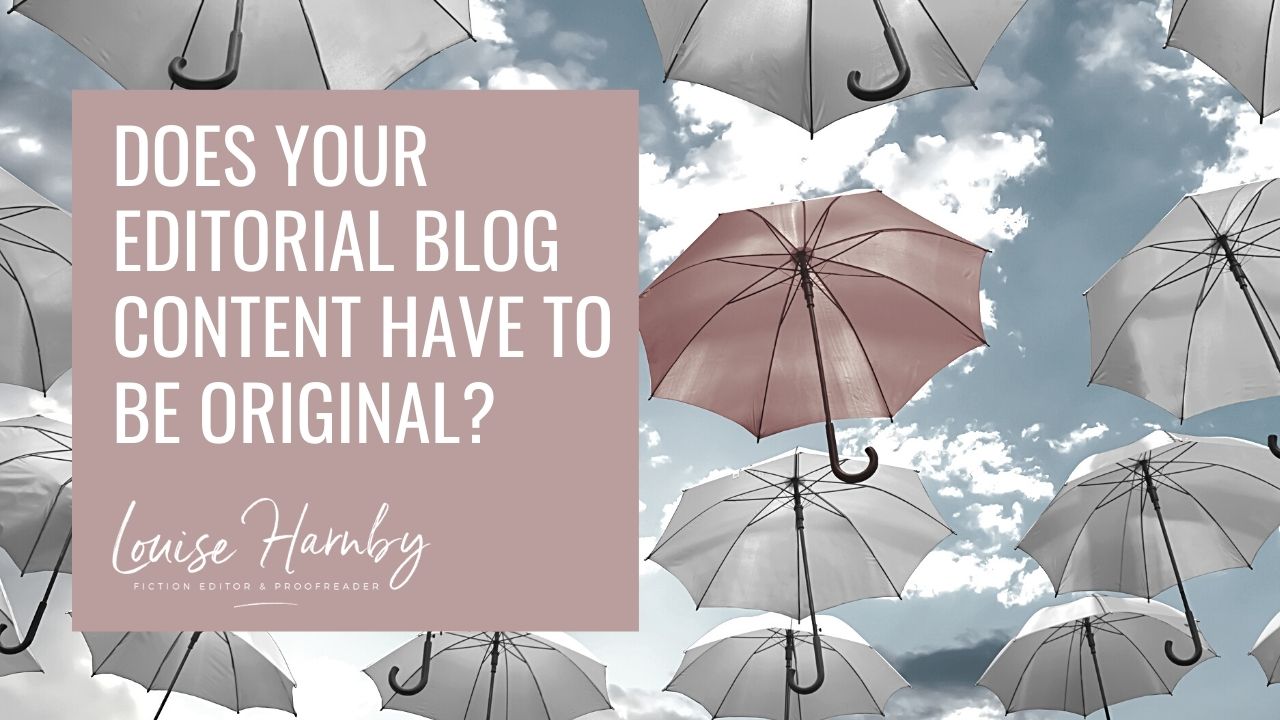
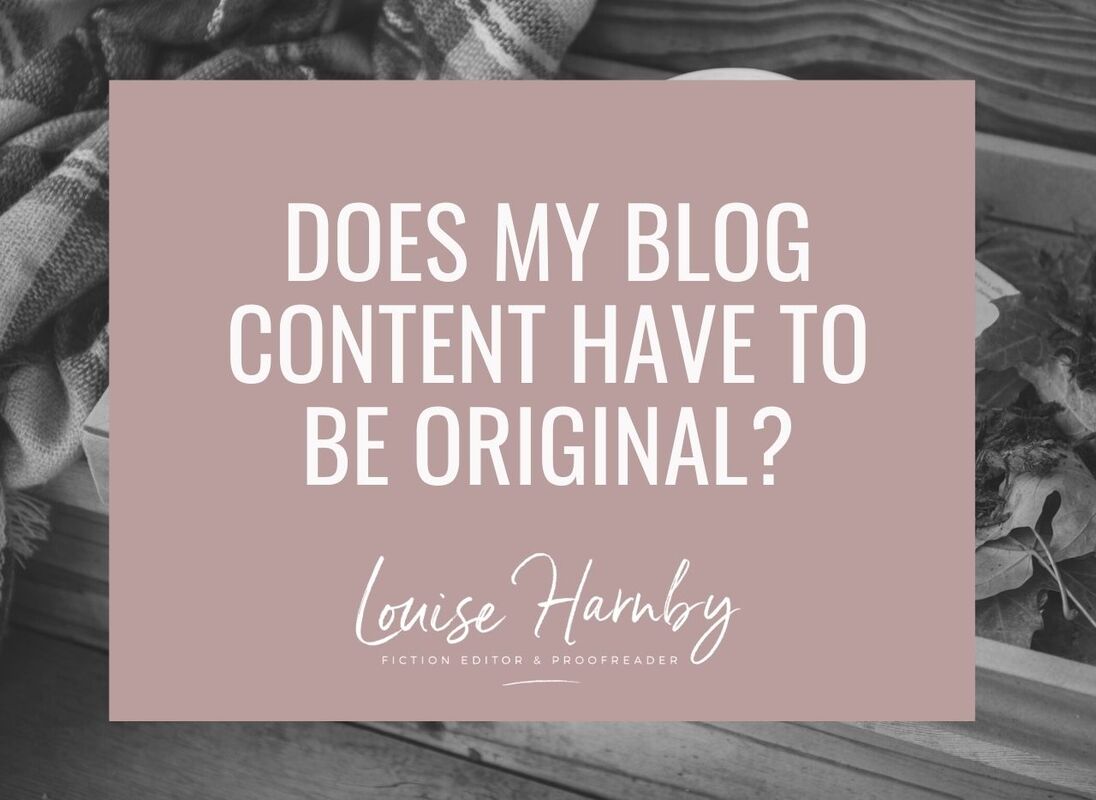




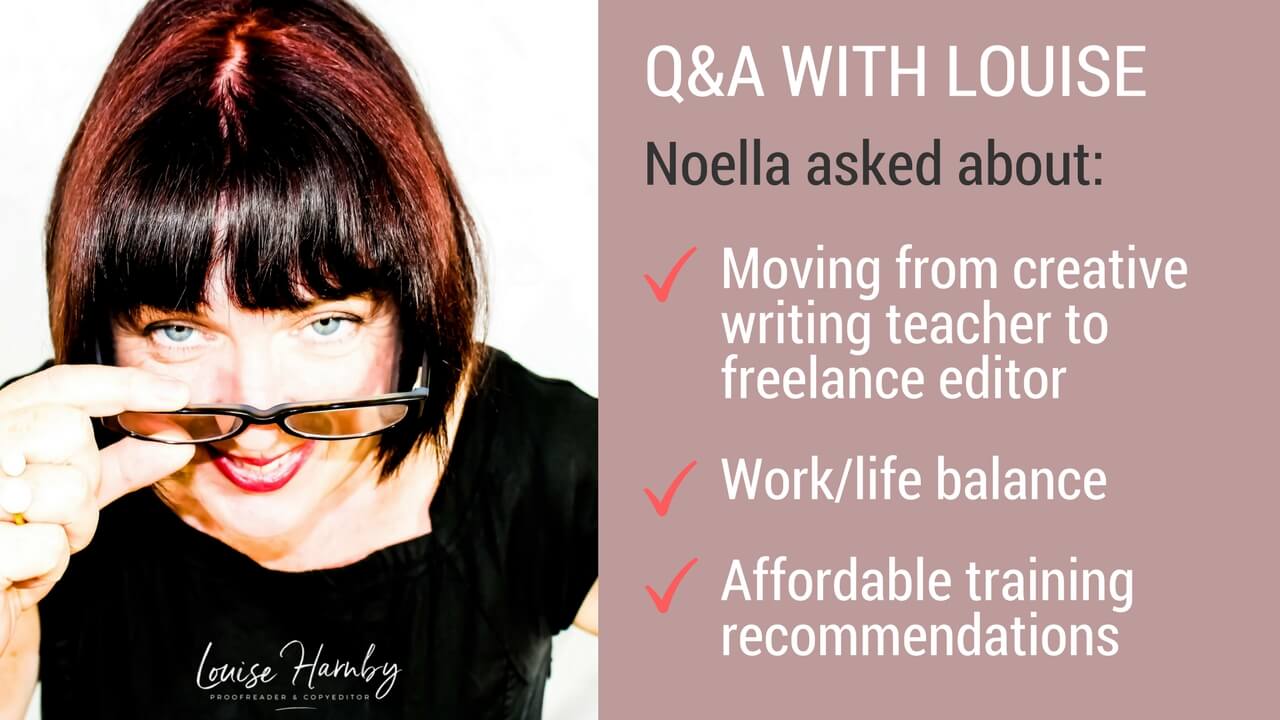
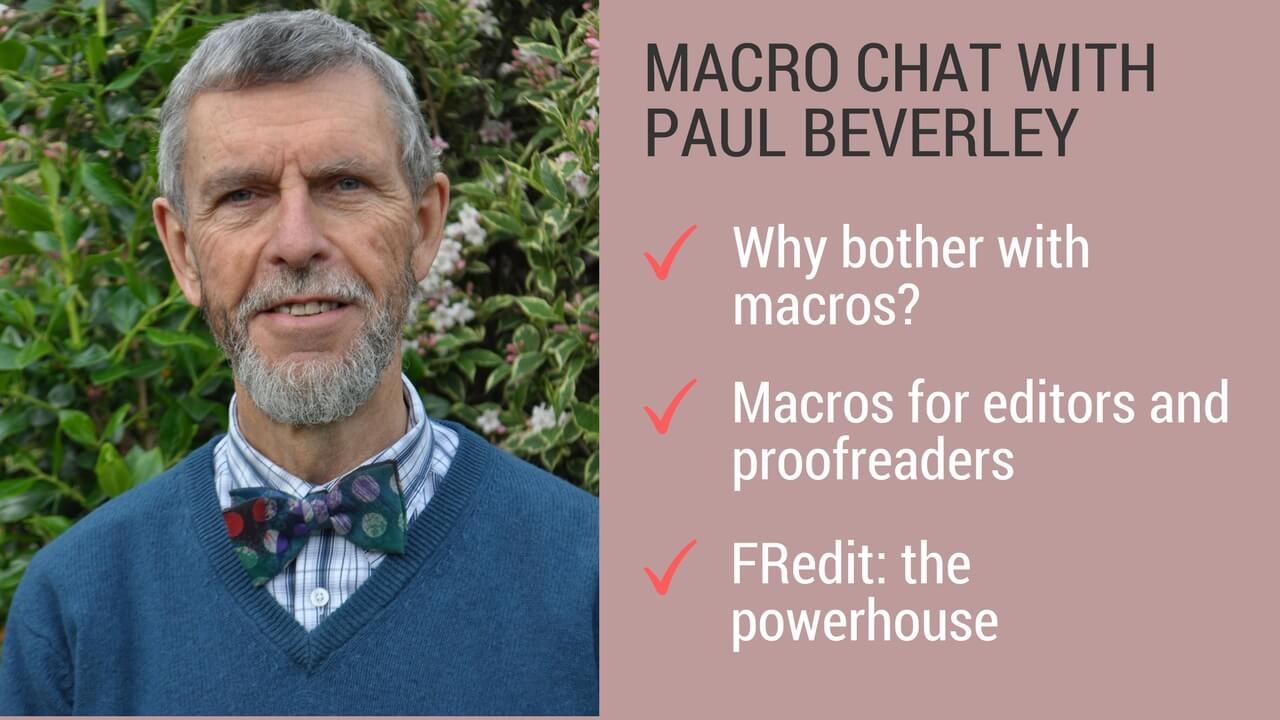
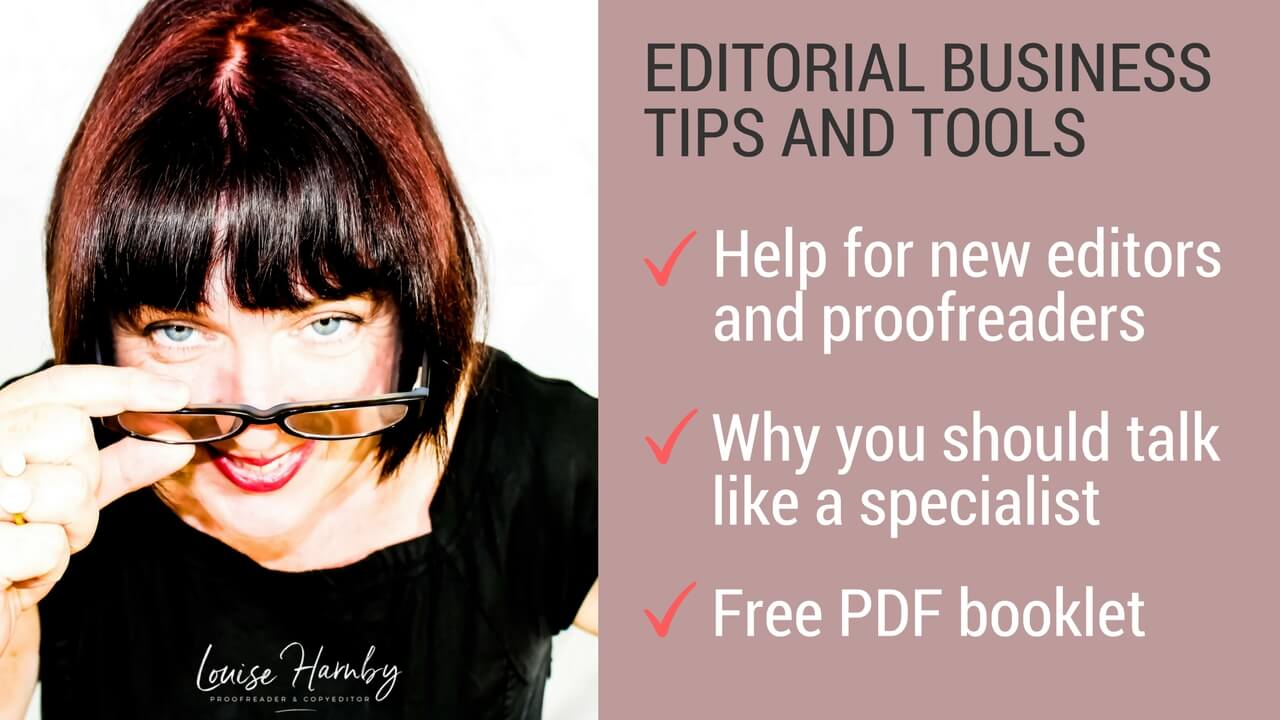
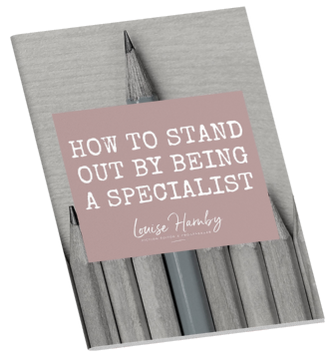
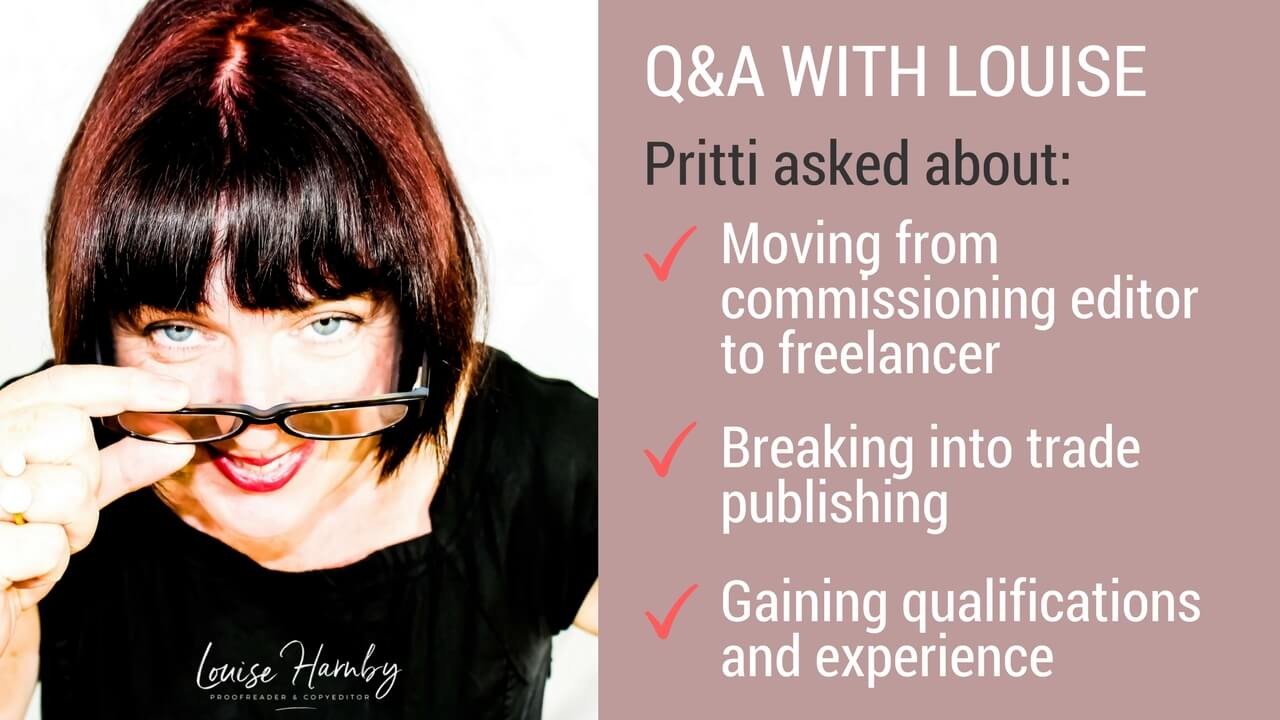
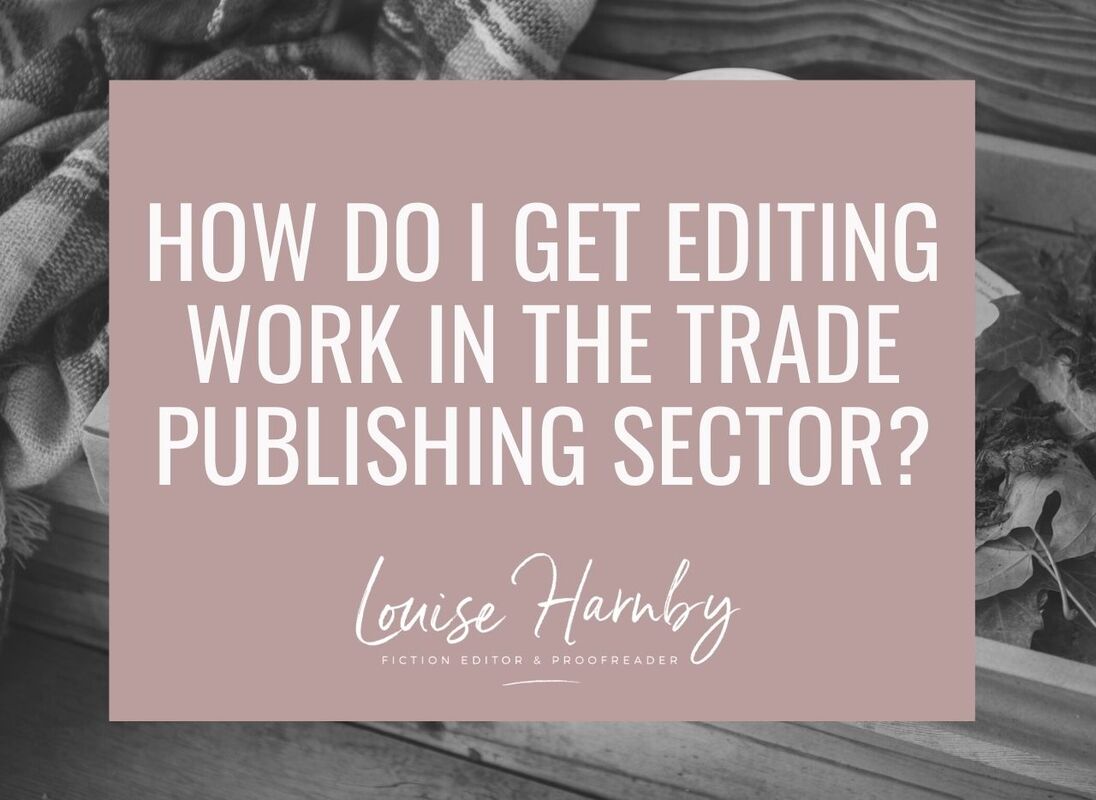
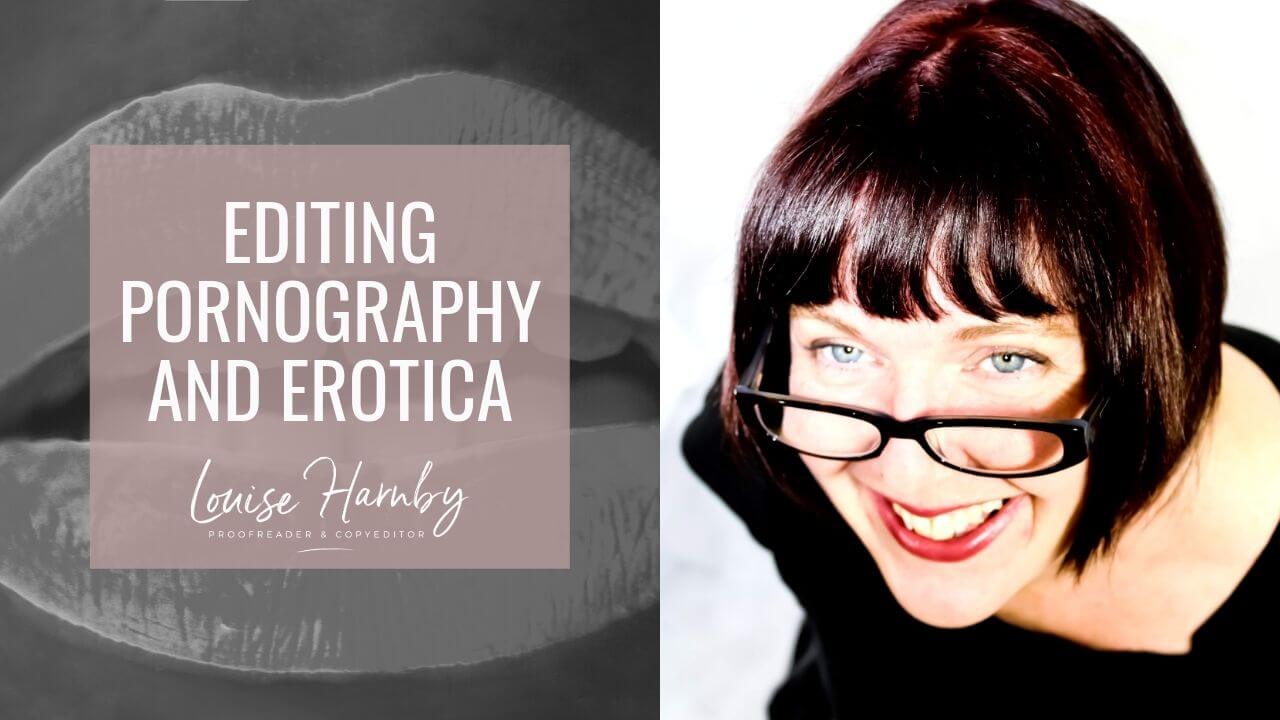
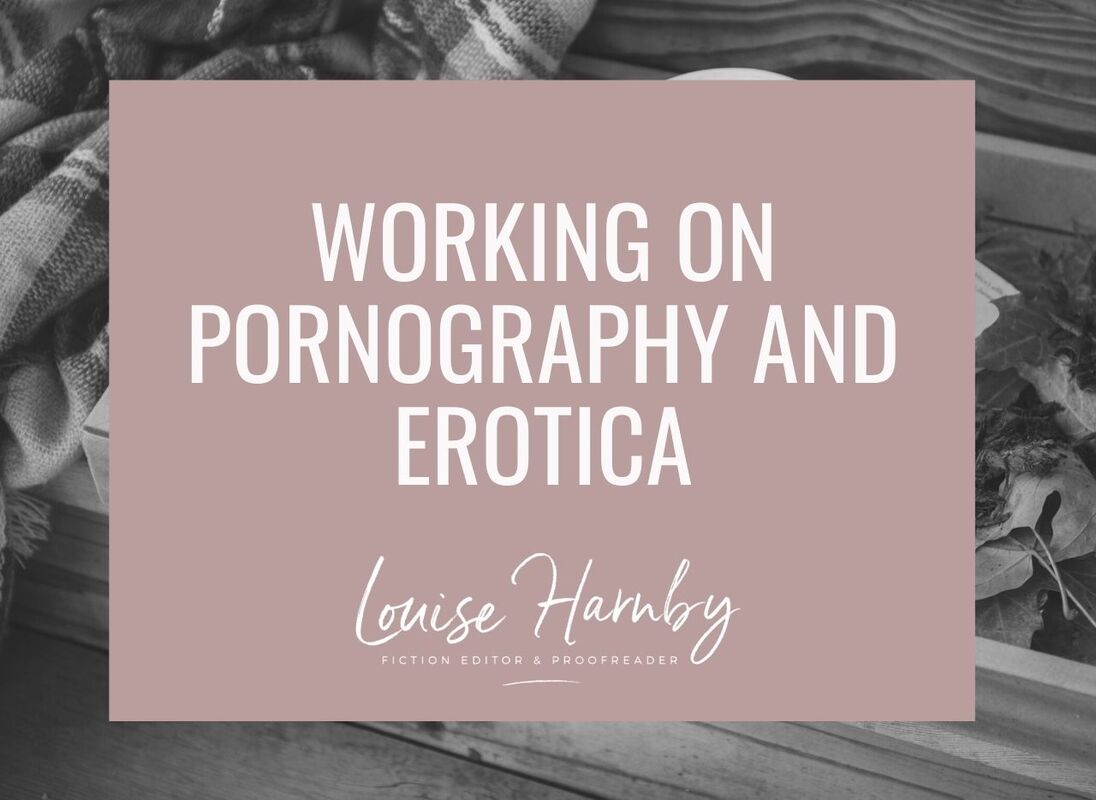


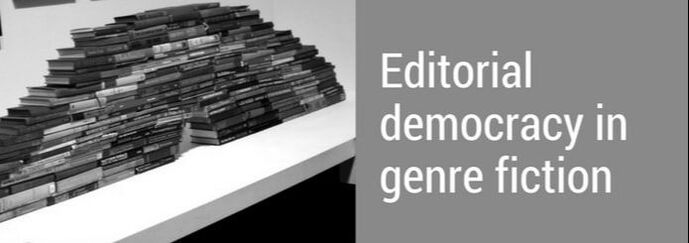

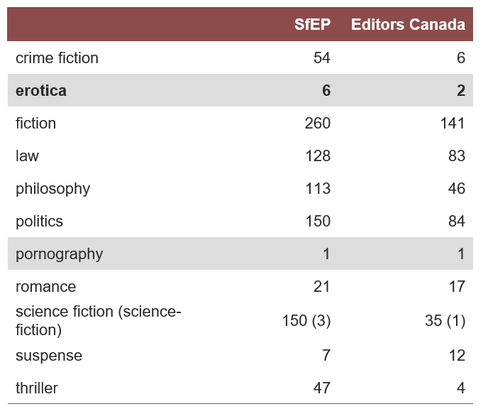


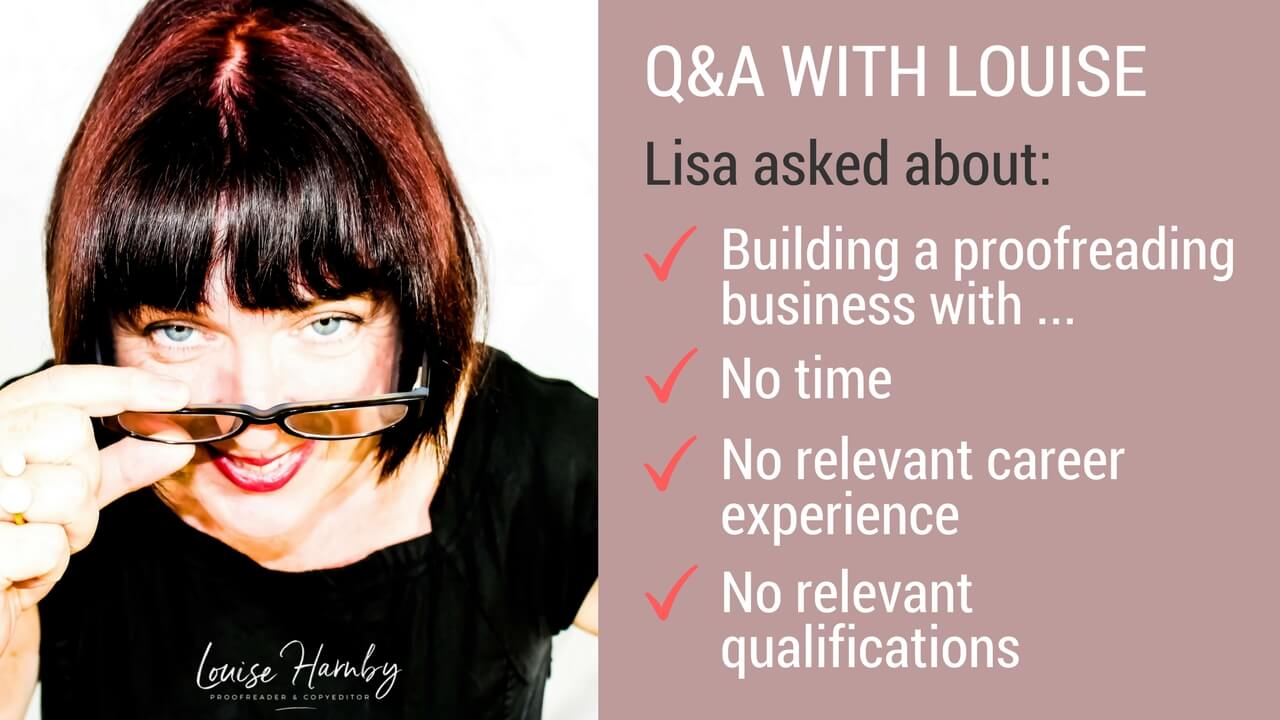
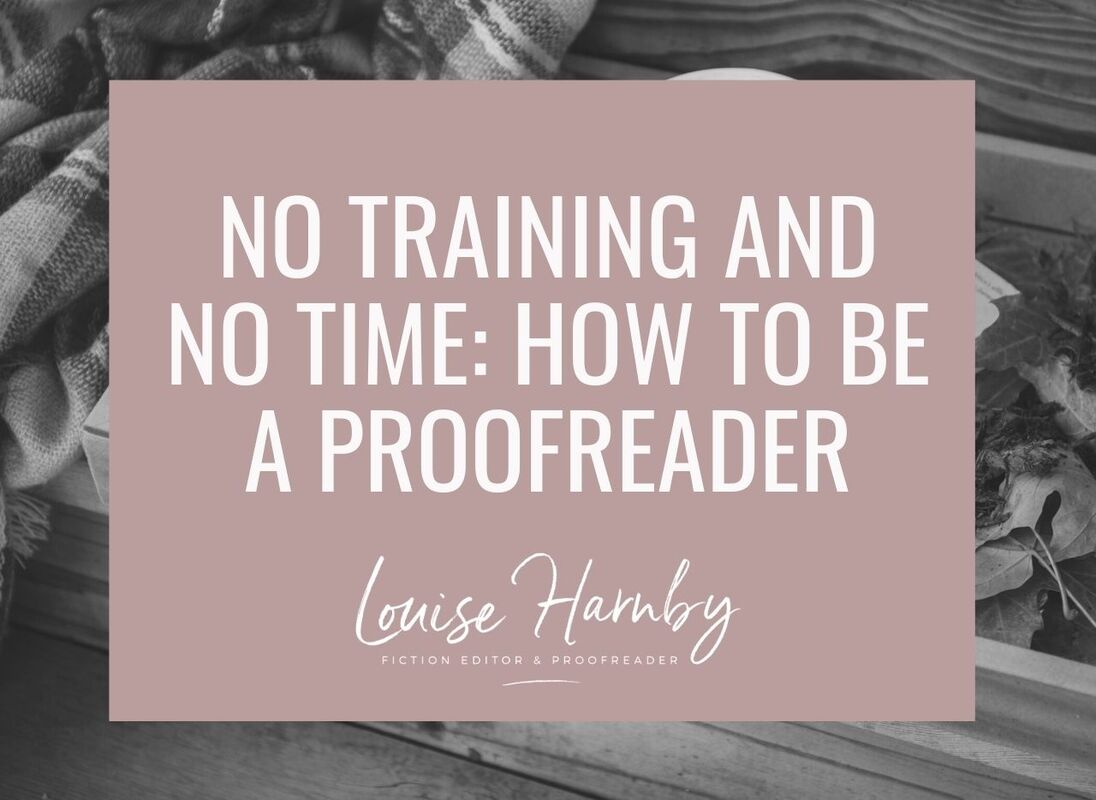
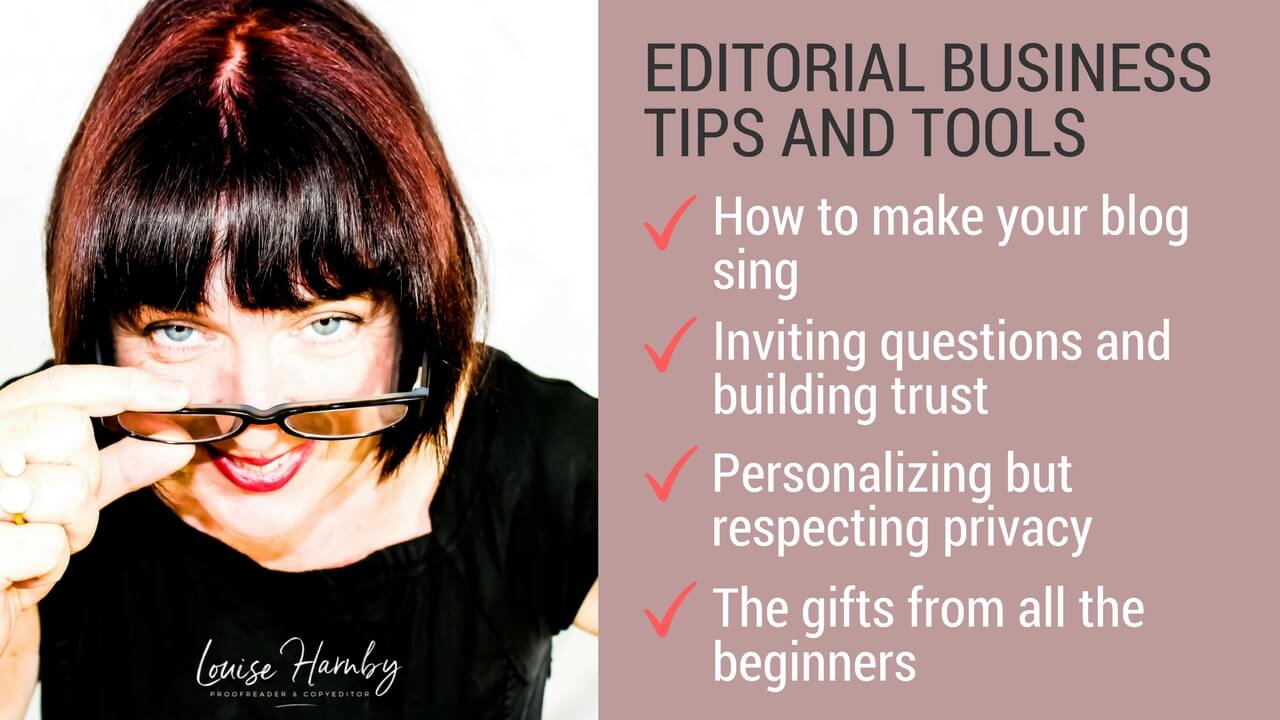

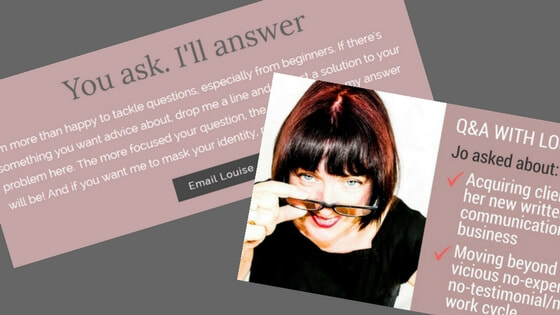
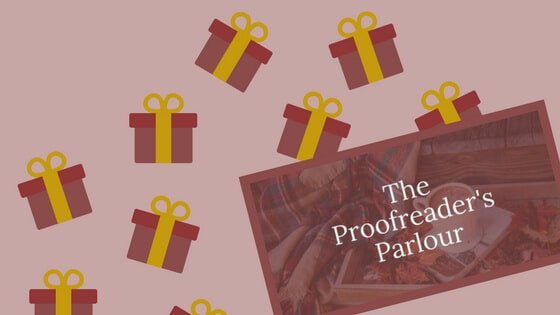













 RSS Feed
RSS Feed





